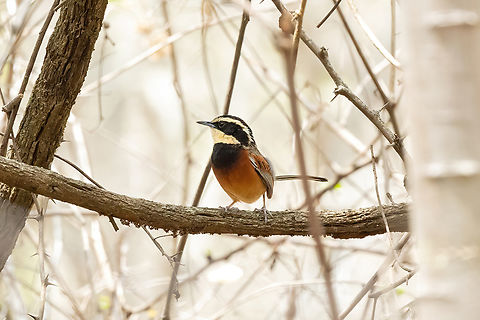
Appearance
The elegant crescentchest is 14.5 cm long. Males weigh 16.0 to 20.2 g and females 15.5 to 19.0 g Males of both subspecies have a black crown, nape, and mask and a creamy supercilium. The back and rump are olive-brown. Its throat is white or pale buff that is darker around the margins and a black "bib" is below it. The upper chest is dark chestnut fading to tawny on the flanks and belly. The nominate female is similar, but the crown is sooty and there is no dark chestnut on the chest. The female "M. e. paucalensis" is like the nominate except that its crown is the same olive-brown as the back.Distribution
The elegant crescentchest is found discontinuously along the coast of Ecuador from Manabí Province south into Peru as far south as the Department of La Libertad. The nominate is in Ecuador and "M. e. paucalensis" is in Peru, and birds in far southern Ecuador might be intergrades between the two subspecies.Status
The IUCN has assessed the elegant crescentchest as being of Least Concern. Though it has a somewhat restricted range, it occurs in several protected areas and tolerates habitat disturbance.Habitat
Its principal habitat is scrub and undergrowth in semi-arid woodland; it can also be found in more humid disturbed areas. In Ecuador it ranges from near sea level usually to 2,000 m and locally to 2,400 m. It Peru it reaches only as high as 1,700 m.Reproduction
Almost nothing is known about the elegant crescentchest's breeding phenology. Three nests have been described. They were constructed of dry strips of cactus and weeds, were enclosed with a side entrance, and hidden on the ground.Food
The elegant crescentchest's diet has not been reported. It forages alone by hopping through dense cover on and near the ground.References:
Some text fragments are auto parsed from Wikipedia.